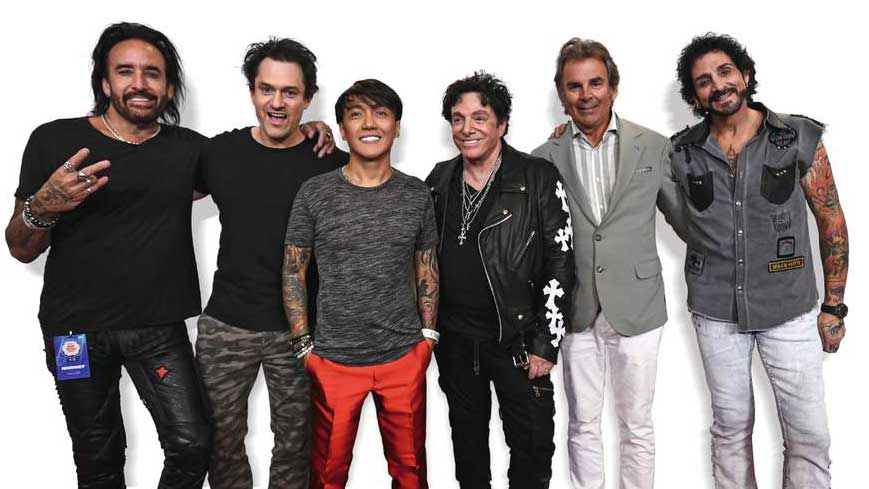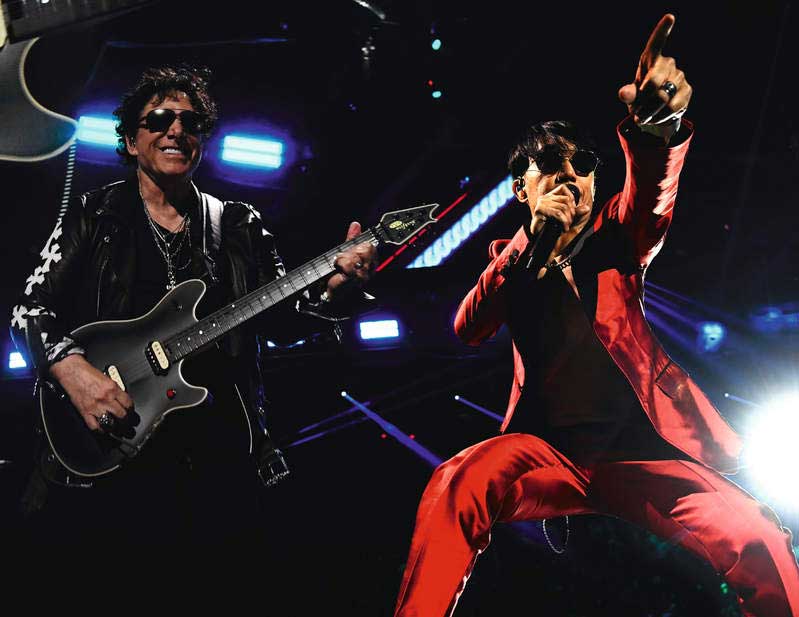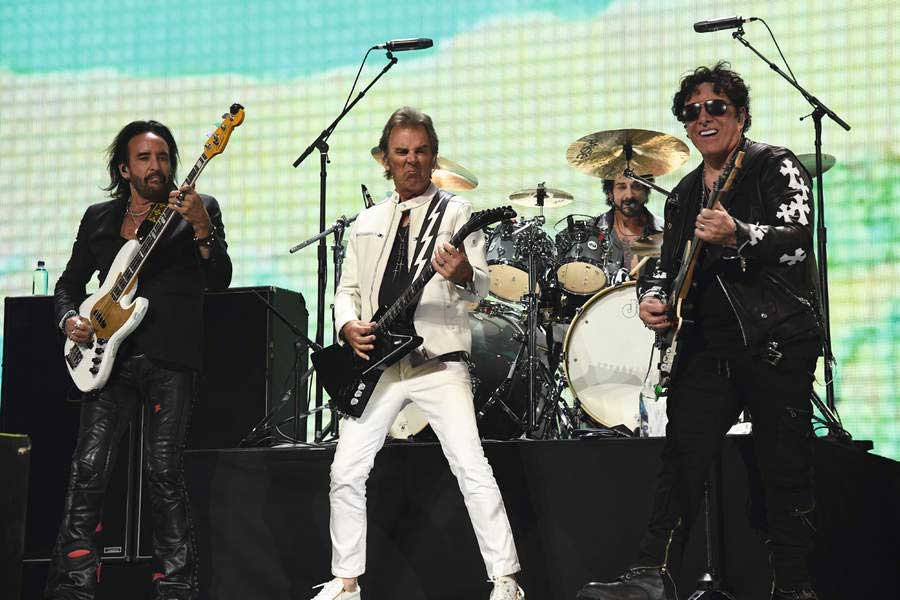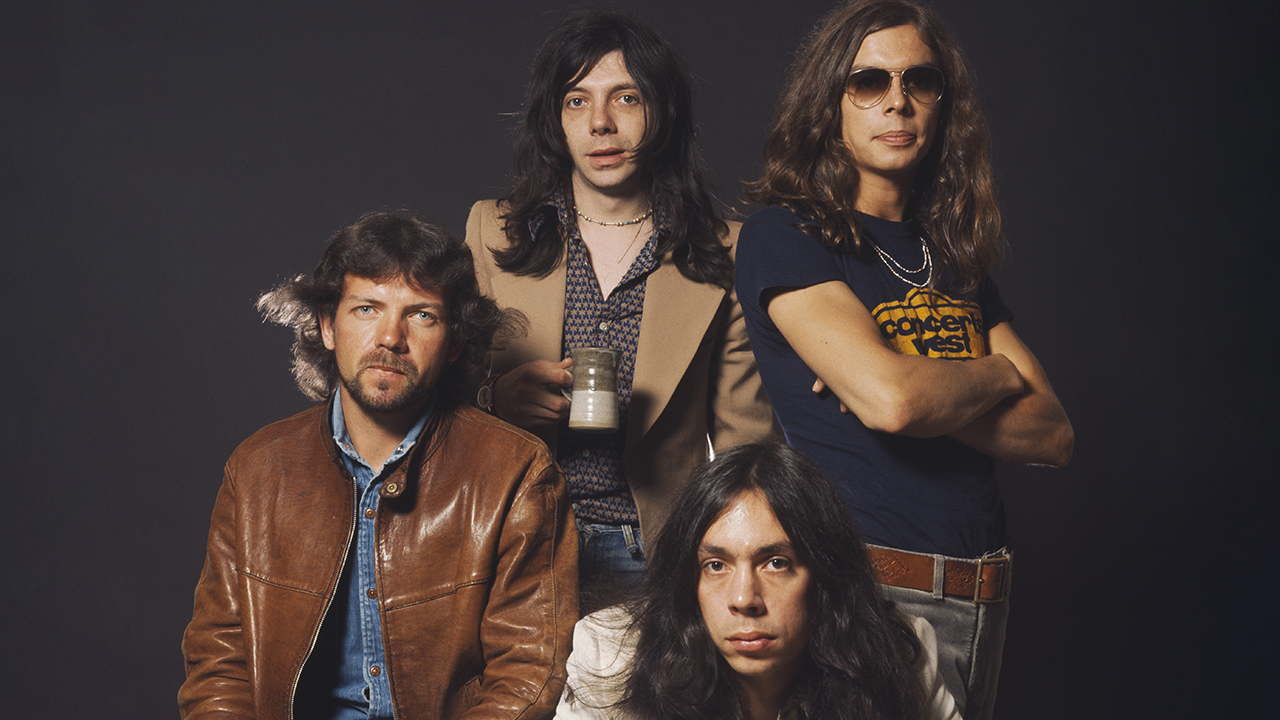The odd couple: the brotherly battles at the heart of Journey's Freedom
Given the years of mud slinging, threats, power grabs, lawsuits and general animosity, it looked like Journey’s 2011 album Eclipse might have been their last. But then Freedom arrived

It was Bruce Springsteen who finally got Journey into the Rock And Roll Hall Of Fame. The hard-rock giants had been eligible for inclusion since the year 2000, and had the record sales (gold, platinum and diamond discs up the wazoo) and the all-pervading cultural influence (you’ve heard of Don’t Stop Believin’, right?) to back it up. But year after year the HOF gatekeepers said no. Enter The Boss.
“The rumour has it that Springsteen, who’s a big deal for the Rock And Roll Hall Of Fame, sang Don’t Stop Believin’ at a benefit with Elton John and Lady Gaga one night,” says Journey keyboard player Jonathan Cain. “He said: ‘That’s a killer tune, yeah. Journey, we should give them a shot.’ So he started championing us with the Hall Of Fame. They put us in the ballot, and the fans who voted us number one did the rest.”
And so it was that several current and past members of Journey gathered on stage at Barclays Center in Brooklyn on April 7, 2017 for the Rock And Roll Hall Of Fame induction ceremony. Co-founding guitarist Neal Schon was there, along with second-longest tenured member Cain. So too were original keyboard player Gregg Rolie and drummer Aynsley Dunbar, bassist Ross Valory, drummer Steve Smith and, most surprisingly of all, vocalist Steve Perry, who had seemingly turned his back on both Journey and the music industry in the late 90s.
It was, as they say, emotional. It was also Journey, a band whose graceful power and perfectly poised music is in inverse proportion to their capacity for squabbling, in-fighting and shit-talking. The HOF induction marked the beginning of an almost comically turbulent period in which Schon and Cain had a very public falling out in 2017 over a trip to the White House. They patched things up, only to fire two long-standing band members over an ill-fated ‘coup’, instigating a potentially ruinous lawsuit.
Oh, and somewhere in between they ditched their longtime managers for good measure. That Journey are still here after 40-odd years of that kind of behaviour is remarkable. But not as remarkable as the fact that they’ve just delivered their first new album in 11 years, Freedom. It’s a record that draws on the Journey of the past and updates it for today. It’s no Escape or Frontiers, but it certainly doesn’t disgrace itself in their company.
“I’m always in creative mode,” says Neal Schon. “My work is never done. But I never lost hope that we’d do another Journey album. Not at all."

Even speaking separately, it’s clear that Neal Schon and Jonathan Cain have little in common other than being members of Journey. The guitarist is fast-talking and passionate, wearing his zero-tolerance approach to music industry bullshit proudly. “I said: ‘How about I wrap the fucking guitar around your neck?’” is the conclusion to one anecdote about once working with a producer who rubbed him up the wrong way. You’d imagine being in a band with him would be eventful.
Sign up below to get the latest from Classic Rock, plus exclusive special offers, direct to your inbox!
By contrast, Cain is measured and calm, answering questions about the band’s turbulent recent history and his relationship with Schon thoughtfully. “There’s always going to be bumps in the road,” he says of the dynamic between them. “No forty-year relationship is ever not going to have them.”
Even before those bumps in the road appeared, Schon was putting the responsibility for the lack of a follow-up to Journey’s last album, 2011’s Eclipse, squarely at Cain’s door. He claimed Cain had no interest in recording a new album. Cain doesn’t dispute that, although he says he always intended to make another Journey record – it just had to be at the right time.
“The amount of money it takes for us to make an album in the studio is extraordinary,” says Cain. “You’re talking six or seven hundred grand. The Eclipse album had been extraordinarily expensive and I didn’t think anybody had any fun making it. It was the worst seller of everything we’ve ever done. It left a bad taste in my mouth.”
He says it was the pandemic that shifted his attitude to new Journey music. “Covid made this album happen, a hundred per cent. I wrote a thing about a guy and girl not sure why they broke up and missing each other. It had parallels with the separation so many couples had to endure.”
Those lyrics, hitched to “a bluesy, pissed-off loop” that Schon had come up with became the starting point for the new album and its first single, the soaring The Way We Used To Be.
Cain puts his resurgence of interest in a new Journey album down to something much higher: call it divine intervention. In the mid-2010s he became a devout born-again Christian after meeting his current wife, the conservative pastor Paula White.
“Singing music for the Lord seems to have helped my creativity,” he says. “I gave my gift to God and it spilled over into the Journey thing. The lyrics kept flowing out of me.”
It was Cain’s faith that indirectly caused the rift between him and Schon. Cain’s wife has been a friend of Donald Trump for two decades, and when the mogul was elected president he appointed White the chair of his evangelical advisory board – effectively his spiritual advisor. Cain says he likes Trump, a fellow golfer. “This guy is not who they say. They paint him as a villain, but it’s far from it.”
When the then President Trump invited Cain and the rest of Journey – with the pointed exception of Schon – for a tour of the White House, he jumped at the chance.
“I’ve never put any politics into Journey’s music,” says Cain. “I’m not going to run on stage in a ‘MAGA’ hat. It was just a tour of the White House, that was supposed to go down pretty unnoticed. Unfortunately it got noticed.”
It certainly did, not least by Schon. What followed was a one-man Twitterstorm in which the guitarist took a flamethrower to Cain, his wife and the entity that was Journey at the time. The gist of it – and we’re paraphrasing here – was: ‘Journey isn’t and has never been a political or religious band, and by the way, Journey is my band.’
An unfortunate series of events went down,” Cain says evenly. “They chose to come against me and my wife and take it public, and it was a mistake. I stayed clear of it.”
Cain thinks that part of the problem, and also the solution, was his memoir, Don’t Stop Believin’, published in 2018. “I think he thought I was going to throw him under the bus in the book. But I was respectful and grateful for everything that he had been part of. It came out, he read it, go figure. Everybody has bumps in the road.”

Except that wasn’t the last bump in the road that Journey would face. By the end of the 2010s, the line-up included original bassist Ross Valory and former drummer Steve Smith, both of whom had previously done time in the band in the 70s and 80s. In March 2020, Schon and Cain fired the pair, alleging they had launched a “coup d’état” to seize control of Journey.
Lawsuits flew both ways, sparking a full year of tiresome and costly litigation that would eventually result in an “amicable settlement”, a phrase that conjures images of gritted teeth and fingers crossed behind backs.
“It came out of the blue,” Cain says now. “They tried to drum me and Neal out. It was unbelievable what they did. Really, really disappointing. Many, many millions were spent battling it.”
Cain has seen his former bandmates once since the lawsuit was settled. Amusingly, he ended up in one of their Zoom meetings by mistake. “I just said: ‘Hey guys, hope you have a good life, we’ll see you down the road.’ What else can you say to someone who tried to come after you? ‘What a pain in the ass you guys were’?”
Despite their differences, the argy-bargy with their former bandmates seems to have brought Schon and Cain closer, at least professionally.
“In the end, he needs me as much as I need him,” says Cain. “You don’t like me or you don’t like my religion or my politics, fine. But in the end we come together to play music. That’s what it’s about.”

One of the few things that Schon and Cain seem to agree on is the nature of their relationship. “I have to look at the positive aspects of it,”says Schon. “Our relationship is more of a musical one. Jon and I have a great chemistry musically. When we get together we always come up with something that’s happening.”
Schon is at home in Marin County, north of San Francisco. A few awards for record sales are on the wall behind him. It’s not vanity, he says of the discs, more to make his computer room look a little more lively on Zoom calls.
“This is the only room with that stuff, all the rest is in my attic,” he says. “I don’t need to look at that every day to feel good about myself and what I’ve accomplished. I know what I’ve accomplished.”
Like Cain, Schon hasn’t stopped making music since Journey released their last album, Eclipse, in 2011. In that time he’s released four solo albums, reunited with his old mentor Carlos Santana for 2015’s Santana IV album, and guested with the likes of Jimmy Barnes, Jason Becker and Sammy Hagar, his old bandmate in one-and-done supergroup HSAS. Schon is as open as Cain about the tensions of a few years ago, although blunter.
“I was very vocal about it publicly,” he says. “Everybody hated that. But, you know, I’m like, I’m gonna put it out there, because I want the fans to either back me or say: ‘Man, you should shut up and go behind the doors with this.’ And there was an overabundance of people that came forward and said we support you a thousand per cent.”
He sighs. “Bands… you get married to these guys. And like in a marriage, people can go in different directions. Bands can be difficult and challenging, but removing certain individuals…”
Ah, ‘certain individuals’. The legal entanglement with Ross Valory and Steve Smith was, he says, “an ugly thing to go through”, but indirectly it gave Schon the impetus to make a new Journey album. When he and Cain were fishing around for a new drummer to replace Smith, the guitarist suggested Narada Michael Walden.
A respected journeyman who has played with and/or produced a list of artists that includes Santana, Jeff Beck and Diana Ross, Walden produced Schon’s last solo album, 2020’s Universe, and the two had hit it off in the studio. Schon liked the idea of making a new Journey album with him.

“Nobody was really into having new music, except for myself and, I think, Arnel [Pineda, Jouney’s vocalist since 2007],” says Schon. “Having that support [from Walden] where it wasn’t there before, there was none of this, ‘Well, I don’t know if I want to make a record.’ It was, like, ‘Let’s go, man, let’s go now!’”
As the title suggests, Freedom covers a lot of ground musically, from the solid-gold hard rock of Together We Run to the un-Journey-like etherealness of After Glow (sung by recently returned drummer Deen Castronovo). But there’s another, deeper significance to the title. In 2020, Journey parted company with their longtime manager, industry powerhouse Irving Azoff, who took over from original handler Herbie Herbert when the band reunited in 1995.
As Schon puts it: “I managed to get out of the clenches of the old management we were with.” He’s cautious about going into too much depth – “I’m trying to think of an easy way of putting it that you’re not going to twist” – then proceeds to go into quite a lot of depth anyway.
It’s complicated and business heavy, but the gist of it is that Schon feels he wasn’t being given the full picture when it came to tickets and merchandise. Such was his suspicion, he started consulting car park attendants at Journey shows to get a sense of just how many people had come to that night’s gigs, and whether it tallied with what he was being told. There was a fight to be had and, Schon being Schon, he was up for it. “
I fought so hard with everybody: management and accountants and lawyers,” he says. “I was being threatened by every attorney – even my own at some times. I was gonna be sued by everybody, just to back off. They really tried scare tactics. I went: ‘Fucking bring it, man. I’ve got the goods. Just try to fuck with me.’”
The upshot was that Journey parted company with Irving Azoff in 2020. Talking about the whole episode, Schon sounds exasperated but defiant. “I love music, I love playing guitar, I’m a real musician,” he says. “But at the same time, this is going to be my fiftieth year in this band next year. The only founding member still here. I felt it was my duty to start paying attention and watch what was going on, to watch over the mothership. If someone’s gonna make billions of dollars off us, I don’t see why it shouldn’t be us.”
The past few years haven’t just been a series of soul-sapping arguments and lawsuits. There was Journey’s induction into the Rock And Roll Hall Of Fame in 2017 – a long-overdue night of reunions, rapprochements and general celebration. At least that was what it was supposed to be. In reality there were a lot of what Schon calls “dynamics” going on in the build-up.
“I refused to go without Gregg [Rolie, original Journey keyboard player], because he was there in the beginning with me, and they didn’t want him,” he says. “Two days before we were actually due to go to the event, I said I’m not showing unless Gregg comes. I stood my ground and they fucking hated me for it.”
There was weirdness on the night too, although talking to Schon it’s not entirely clear how or what. “If you notice, certain people were in maroon suits,” he says conspiratorially. “Our manager had a maroon tie, Ross [Valory] had a maroon suit, Jon had a maroon jacket…”
Colour-coded strangeness aside, the event provided one genuinely emotional moment for Schon, and for Journey fans too, when they were joined for their acceptance speech by Steve Perry – the first time Schon had spoken to Journey’s former singer since 2005.
“The best part of the evening was speaking with Steve Perry in his room before we went on stage,” says Schon. “We hadn’t seen each other for many years. That was the most moving part of the evening to me. We really had a connection, and a love for one another. It was emotional, I think for both of us."
Perry‘s appearance inevitably sparked rumours ahead of the night that he might rejoin Journey for their performance at the ceremony. But it never happened, and Schon still sounds disappointed.
“I was ready if he wanted to do it at the last second, to do Lights or something like that. I thought he would do it on the night. And he declined. You know, it is what it is.”
And the Hall Of Fame themselves? Schon says he gave them “a bunch of guitars” to put on the walls, but they never did it. “You know what?” he says triumphantly. “I don’t really care.”
And so here Journey are, in 2022, armed with one of the best albums they’ve made since their 80s' heyday, yet still finely balanced between tiptoeing around each other and wanting to shout: “To hell with it” and stamp on each other’s feet.
Schon says he’s ready to do another album as soon as he can. He came up with 2,500 ideas for Freedom, all of which are stored on his iPhone.
“Are we going to wait another eleven years to do another album? I don’t think so. Do I want to do another one? Absolutely. And I’m sure we’re going to do another one after that. As long as I’m here, we’re gonna keep creating.”
Cain is more pragmatic about another Journey album after Freedom.
“Yeah,” he says cautiously. “I could do it if I had to. If it was put on me. It would have to warrant it. If this album is not a success, why do another one?”
Of course, no one knows what the future holds for Journey, not even the odd couple at the centre of it all. Spats? Maybe. Bust-ups? Possibly. But smooth sailing? That would be too easy – which wouldn’t be very Journey at all.
Freedom is out now via Frontiers.
Dave Everley has been writing about and occasionally humming along to music since the early 90s. During that time, he has been Deputy Editor on Kerrang! and Classic Rock, Associate Editor on Q magazine and staff writer/tea boy on Raw, not necessarily in that order. He has written for Metal Hammer, Louder, Prog, the Observer, Select, Mojo, the Evening Standard and the totally legendary Ultrakill. He is still waiting for Billy Gibbons to send him a bottle of hot sauce he was promised several years ago.

